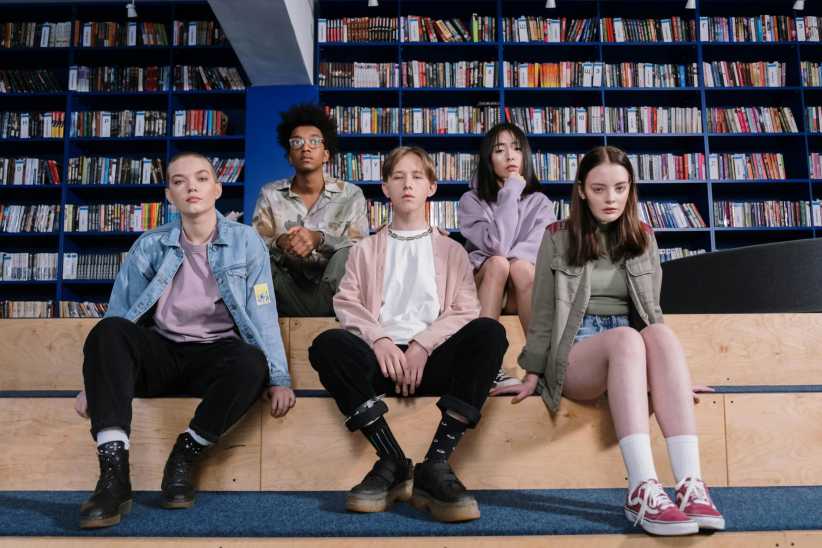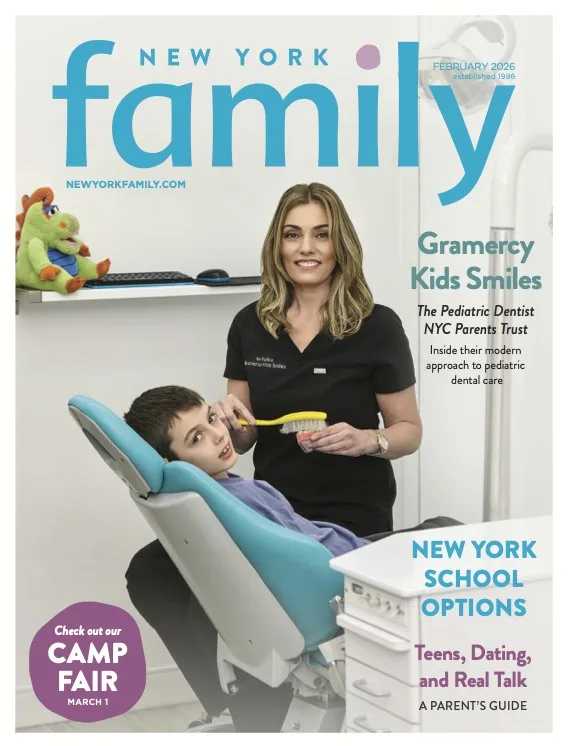
Editor’s Note: For more on education in New York City, see our article “Know Your Resources“
One of New York Family’s community-minded events is the annual Blackboard Awards, which is the longest- running and most prestigious celebration of excellence in local education, honoring schools, principals, and teachers from all education sectors (public, private, charter, and parochial) and grade levels. In addition to being a celebration of everyday educational heroes, the Blackboard Awards are also intended as a resource for parents. In that spirit, we asked the honorees of the 2014 Blackboard Awards for Teachers about how parents can help their children reach their full potential in school. Here’s what they had to say.
Karey Boals, The Chapin School: “It’s important for students to have a sense of purpose and long-term goals. Students can become solely focused on the short term and can easily lose sight of the long term. Reminding them to ‘pull back the lens’ will be invaluable to them. It is also important for students to feel connected. Connected to parents, friends, teachers and counselors. This will promote academic, mental, and emotional success and strength.”
Evan Burns, Democracy Prep Charter High School: “Speaking from a teacher perspective, it’s always helpful to have parents who are interested in what their kids are doing at school. At home, inquire about their schoolwork. Ask them what they’re writing or reading. Ask to read what they’ve written and embarrass them by showing off the good work they do. The more we layer our support of our kids’ education, the more leverage we have on impacting them positively.”
Willie DeVargas, Little Missionary’s Day Nursery: “I would say: Listen to your children. Listen to them more. Kids actually don’t have a voice, and they speak up sometimes but we just don’t listen and we just don’t see what they’re wanting and what they’re feeling. Just listen to them and really get down to their level and listen to what they’re saying and not just miss it. It’s very important to know what the concerns are. That way, we can help them further in life and to achieve accomplishments.”
Nicole DeVault, Alexander Robertson School: “I have advice as a parent on how to help your child reach their highest potential at school, as well as, in life and that is to give them unconditional support and love. This is what I learned from raising my son on my own. No need to compare your child to another child because each and every one is gifted and what you may not see at this moment will develop and reveal itself later with more and more revelations. There is no set-in- stone timeframe and therefore it is important to let your child’s development unfold naturally. I believe as a parent that honest self-reflection is vital. We are role models and need to walk the walk and talk the talk. Children cannot be fooled. Personally, I believe in a having a loving ‘spiritual’/ethical practice shared by the family that builds a strong foundation of morals and values. Teaching our children to make the right choices and to be proud of those choices will benefit not only your child and your family but everyone with whom they cross paths.”
Bayard Faithfull, The Beacon School: “As a teacher and a parent, I hope that families encourage a love
of learning. There is a magic to encountering new ideas or solving difficult problems. In a society that is technology-saturated, we as parents need to find time to talk with our kids and have wonderful experiences with them. I am a believer in having conversation at dinner. I am a believer in sharing simple pleasures together.”
Dana Kaplan, PS 33—Chelsea Prep: “I believe in the four C’s: Commitment, collaboration, communication, and compassion. We must be committed to working through challenges while also examining whether the challenge is the parent’s or the child’s. We are guests in our children’s educational journey. We should strive to model independent thinking, support out-of-the- box ideas, and to hear and see each child for who they are as opposed to what we want them to be. As a model for your child, celebrate your imperfections. This articulation empowers and challenges your child to move forward in a positive light. I believe it is imperative to share with your child that we must always try, fall, and pick ourselves up rather than to never try at all. Applying this commitment to all life endeavors establishes a sense of compassion towards oneself and our community while promoting determination, dedication, and passion to this wonderful exploration known as life.”
Dr. Katarina H. Klaf, PS 77—The Lower Lab School: “My advice to parents is to take time to foster curiosity and creativity. I try to do this in my classroom but parents are essential partners in education, their actions can reinforce what their children learn in school. They too can model for their children the kinds of thinking that are needed in today’s complex world. I encourage parents to speak with their children, question them about what they are learning, actively listen to their children’s responses, and support their children’s interests no matter what they may be.”

Sarah Liogys, NEST+m: “Be a partner with your child’s school. We all have the same goal: To help your child be a happy, well adjusted successful adult! We are all stronger when we work together and play for the same team—your child’s. And, in the wise words of my own mom: Love your children unconditionally.”
Heather Meisner, PS 198: “There is so much that parents can do. Talk to your kids. Expose them to the world. Answer their questions, but also throw them back. Respond with: ‘Well, what do you think?’ And: ‘What makes you think that?’ I also think independence is a huge component. Students come from home and the ratio of adult to child is 1:2 or something pretty close. Within minutes they are in a class where the ratio can be up to 32:1. They have no choice but to be independent problem-solvers at times. Giving children responsibilities at home transfers over to the classroom. In the beginning of each year I ask my parents to stop packing their child’s backpack and have the child start to do it. These little things really set a child up to be successful in school.”
Laura Resnick, PS 87—William T. Sherman School: “My greatest advice is to be actively engaged in your child’s education. Encourage them to find greatness in themselves, and model that behavior through your actions. Get involved in the classroom curriculum by communicating with the teachers, reading through classroom work and homework, and having discussions at home about the school day. Parents can bridge the classroom learning to the home by reading together, researching topics on the computer or at your local library, or planning a family outing that relates to what your child is learning in school. When parents show they care and are supportive of their child (no matter how good their grades are), their child will want to learn and will be excited about learning. Create a loving, caring, and understanding environment that allows your child to speak openly with you about their concerns and stress. Listen to what they have to say, validate their words and offer them encouraging advice and guidance. Children want to feel that their parents love, support, and understand them. When this type of environment is created at home, it carries over to children being able to reach their full potential at school.”
Lisa Schalk, Chelsea Day School: “My advice to parents on how to help their children reach their full potential in school is simple: ‘Enjoy your children!’ Read to them, talk to them, listen to them, and come to know them and appreciate them for the unique individuals they are. Enlist them to help at home, to be part of the team of your family. Hold expectations that are realistic for them—that show them that you believe in them and that you hold them accountable so they can rise to challenge, experience success, and come to better know themselves in the world.”
Eileen Shostack, PS 75: “I believe that parents should try to act as role models for their children. Rather than telling their children to show respect, cultivate an atmosphere at home that demonstrates respect, care, kindness, a sharing of decision-making and responsibility. Parents need to remain as lovable caretakers who take their children on trips, communicate with them, and prioritize their needs. Bookbags should be checked for notices, homework, and other events that took place at school. This will give the child the idea that school is important and linked to the home. Furthermore, parents should read to their children, enjoy some good conversation and guide the child socially so that they make good friends. Parents should not feel the need to go out and supplement common core teaching materials and testing guides. The school can easily take care of this if the child comes to school with the thirst to learn, make new friends, and discover a bigger world. In our schools today, we have a wealth of materials to teach each child. Hopefully, parents will prepare their little ones at home so that we can all work together to make this a better society.”
Kristen Smith, MS 245—The Computer School: “One of my favorite quotes is: ‘If you’re not making mistakes, then you’re not doing anything’ by John Wooden. I see many students who are afraid of failure, but learning from failure is when real learning takes place. Teaching kids resiliency, hard work, and determination are the skills that will help them be prepared and succeed in school and throughout their entire lives.”
Dennis Sullivan, Saint Ignatius Loyola: “Always be supportive and as actively involved as possible in your child’s academic life. Also, communicate and work together with the teacher to implement the plan that ensures that your child is meeting his or her individual full potential.”
Fran Vogel, MS 167—Robert F. Wagner Middle School: “In today’s environment of over testing and emphasis on grades, parents need to understand that this attention to rigor may not be the skill that will foster creativity and higher-order problem-solving. Parents need to expose their kids to activities that develop these skills. Exploring the world of ideas should be fun—awakening curiosity and delight in the children.”










